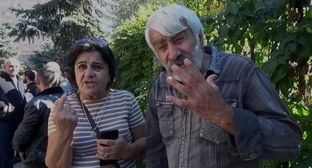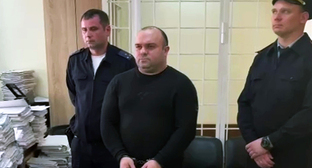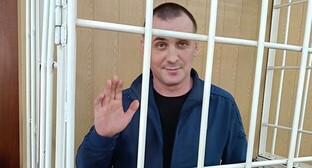
23 October 2023, 23:14
Week in the Caucasus: review of main events of October 16-22, 2023
Nagorno-Karabakh refugees in Armenia, impeachment of pro-Western Georgia, persecution of pacifists and activists in Southern Russia, deportation of Caucasian natives from France, Northern Caucasus chooses Palestine, and official data on the natives of Southern Russia who perished in Ukraine, – see the review of these and other events in the Caucasus during the week of October 16-22, 2023, prepared by the “Caucasian Knot”.
Nagorno-Karabakh refugees in Armenia
The crisis caused by the resettlement of refugees from Artsakh (Nagorno-Karabakh, – note of the “Caucasian Knot”) continues in Armenia against the background of the development by Azerbaijan of the Nagorno-Karabakh territory and adjacent lands. Other 25 families of internally displaced persons moved from Baku to Lachin, bringing the number of the residents returning to the city to 1072.
On September 19-20, Azerbaijan carried out a military operation and, as a result of the actual capitulation of Stepanakert, gained control over the region. On September 28, the President of Nagorno-Karabakh signed a decree ending the existence of the unrecognized republic. By October 7, 100,632 internally displaced persons (IDPs) from Nagorno-Karabakh arrived in Armenia.
On October 19, Nagorno-Karabakh President Samvel Shakhramanyan signed a decree dismissing all civil servants except senior officials. On October 20, protesters broke into the building of the Nagorno-Karabakh representative office, where Samvel Shakhramanyan stayed, and expressed their dissatisfaction with the decree signed by him. A clash occurred between the protestors and Samvel Shakhramanyan. He tried to leave, but the activists ran after him and beat him. The intervention of the police resulted in clashes between the protesters and law enforcers. Investigators reported the detention of ten participants of the protest action.
According to refugees’ stories, they had to leave Nagorno-Karabakh under shelling attacks, in a hurry, and without any personal belongings. The refugees complain that the money allocated by the authorities of Armenia is not enough to solve their housing and everyday problems and that the Nagorno-Karabakh authorities do not provide any assistance to them. In turn, the Nagorno-Karabakh government has condemned the refugee protest in Yerevan and called on the Armenian police to “rule out” mass unrest.
On October 21, the United States and the European Union declared they “remain committed to advancing a lasting peace between Armenia and Azerbaijan based on mutual recognition of sovereignty, inviolability of borders and territorial integrity” and called on the authorities of Azerbaijan to “ensure the rights and security of those who remain in Nagorno-Karabakh as well as for those who wish to return to their homes.”
Armenian banks began to return money received by Nagorno-Karabakh residents as financial assistance from the authorities, but written off by the banks to repay loans.
Impeachment of pro-Western Georgia
In September, the ruling “Georgian Dream” Party launched impeachment proceedings against Georgian President Salome Zurabishvili, and the country’s parliament sent an opinion to the Constitutional Court to remove her from office. On October 16, six out of nine judges concluded that Salome Zurabishvili had violated the Constitution of Georgia and approved the ruling party’s proposal to remove her from office.
The “Georgian Dream” Party accused Salome Zurabishvili of exceeding her powers because the Georgian President began meetings with European leaders on August 31 without the government’s consent. Salome Zurabishvili is trying to defend the Georgia’s European prospects, the opposition objects.
On October 18, opposition MPs boycotted the impeachment discussion to prevent the ruling party from gaining the required 100 votes. The Georgian parliament was unable to impeach the country’s president, as only 86 MPs voted for such decision. The ruling party will be able to re-initiate the impeachment of the Georgian President only in a year, but the government has the opportunity to continue to put pressure on Salome Zurabishvili and deny her funding for trips abroad.
A failed attempt to dismiss Salome Zurabishvili from office could increase the number of citizens sympathetic to her and complicate the country’s relations with the West, note political analysts. According to one of the experts, Salome Zurabishvili can become a public figure around whom the opposition will unite.
Persecution of pacifists and activists in Southern Russia
In Stavropol, a court fined local resident Mikhail Pugachov after he had posted several photos on the “Odnoklassniki” social network. Mikhail Pugachov admitted his guilt and stated that he understood his mistake.
Yulada Nechvold, who lives in Krasnodar, was fined after a dispute in a store. According to the police, in the presence of other buyers, the woman accused the Russian Armed Forces of illegal actions and blamed all Russian citizens for that. Yulada Nechvold admitted her guilt, which the court considered a mitigating circumstance and reduced the fine to 15,000 roubles.
In Krymsk, a court fined Alexander Khodyrev 40,000 roubles. According to the court’s version, on August 22, while staying on the street in the presence of passers-by, the man spoke out about the actions of the Russian Armed Forces in the special military operation zone in Ukraine.
The Promyshlenny District Court of Vladikavkaz recognized a comment posted by Kazbek Alikov under an interview with a participant of the special military operation (SMO) as discrediting the Russian Armed Forces and fined the man 30,000 roubles. Kazbek Alikov pleaded guilty in court.
At the same time, the Stavropol Territorial Court noted violations committed during the consideration of the case on discrediting the Russian Armed Forces instituted against Valentina Starykh, and cancelled the fine of 30,000 roubles imposed on her.
Deportation of Caucasian natives from France
On October 13, a teacher was killed at a school in the French city of Arras, and two other persons were seriously injured in the knife attack. The attacker, identified as Mokhammad Mogushkov, was detained and charged with murder and attempted murder in connection with the terrorist plot.
On October 17, the court also arrested a younger brother of Mokhammad Mogushkov and his cousin: the attacker’s brother is accused of complicity in murder and attempted murder, and his 15-year-old cousin is accused of intentional failure to prevent a crime. At the same time, suspicions have been removed from Movsar, a Mokhammad’s older brother, who is serving his sentence for terrorist crimes, as well as from the attacker’s 18-year-old sister. She stated that according to her observations, “Mokhammad became increasingly severe in his practice of Islam.”
On October 16, it became known that about 60 people, including natives of the North-Caucasian republics, would be deported from France after the knife attack on the school. The Russian Embassy notes that the authorities of France have actually stopped their cooperation with the Russian Federation in the law enforcement sphere.
Northern Caucasus chooses Palestine
The coordination centre of Muslims in the Northern Caucasus accused Israel of “state terrorism and genocide” with the complicity of the United States and the Western countries and demanded from the UN to intervene in the situation to protect the people of Palestine. In Chechnya, official religious figures organize daily mass prayers in support of Palestine, and residents of Makhachkala tried to hold a rally on October 17, which was dispersed by the police.
Fighting between Israel and the Palestinian “Hamas” movement began on October 7 with hundreds of missiles fired into the Israeli territory. Israel responded by launching a military operation and announcing a blockade of the Gaza Strip. Thousands of people perished on both sides.
On October 20, a similar rally in Khasavyurt was also dispersed by the police. And the Karabudakhkent District hosted a motor rally in support of Palestine. Meanwhile, some of the participants in the rally rode on horses. In Dagestan, according to some reports, 17.5 million roubles were raised in less than 24 hours to help Palestinians.
Official data on natives of Southern Russia perished in Ukraine
By October 22, the authorities and the law enforcement bodies reported about at least 2752 residents of Southern Russia perished in Ukraine, including 1374 residents of the North-Caucasian Federal District (NCFD) and 1378 residents of the Southern Federal District (SFD).
In Dagestan, the authorities reported about 650 local residents perished in Ukraine, in the Volgograd Region – 549, in the Rostov Region – 308, in the Krasnodar Territory – 232, in North Ossetia – 219, in the Astrakhan Region – 210, in Stavropol Territory – 191, in Chechnya – 138, in Kabardino-Balkaria – 109, in Ingushetia – 43, in Adygea – 36, in Kalmykia – 43, and in Karachay-Cherkessia – 24.
This article was originally published on the Russian page of 24/7 Internet agency ‘Caucasian Knot’ on October 23, 2023 at 09:15 am MSK. To access the full text of the article, click here.





Комментирование через Кавказский узел